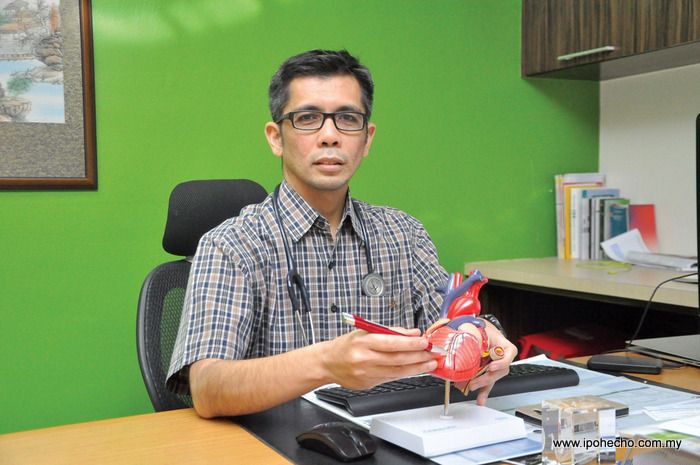

According to data from the World Heart Federation, smoking causes one-tenth of Cardiovascular Disease (CVD), which is the second leading cause of CVD, after high blood pressure. Globally, tobacco causes an amount of six million deaths a year. The risk of a non-fatal heart attack increases by 5.6 per cent for every cigarette smoked and persists even at only one to two cigarettes per day. Bad news for female smokers is that the risk for coronary heart disease is 25 per cent higher than male smokers.
For Cardiologist Dr Hasral Noor Hasni, these statistics have made him an advocate for people to quit smoking and reduce their chances of developing cardiovascular disease.
“Smoking increases blood pressure, decreases exercise tolerance and increases the tendency for blood to clot, all factors leading to CVD,” said Dr Hasral with passion. “Twenty per cent of deaths in local hospitals are caused by heart disease. Cigarette smoke contains over 4000 chemicals, including 43 known cancer-causing (carcinogenic) compounds and 400 other toxins. When you smoke, toxins in the tobacco itself are released and absorbed, causing more cholesterol to deposit in the arteries. Thus, one needs to be aware of the risk factors involved and make lifestyle changes such as to quit smoking,” he added.
An Ipoh boy and a Michaelian, Dr Hasral Noor Hasni spent his secondary school life in Sekolah Tuanku Abdul Rahman, Ipoh. He then completed his Bachelor of Medicine, Bachelor of Surgery (MBBS) in 1996 in Australia, returning to work in Hospital Gerik as a Medical Officer. In 2002, he was attached to the Department of Medicine of Hospital Kuala Lumpur as a Physician.
Deciding to specialise in Cardiology, Dr Hasral worked at the National Heart Institute of Malaysia (IJN) as a Senior Registrar for four years since 2003. Later, he moved to Kedah Medical Centre as Consultant Cardiologist and Physician. Since then, he has returned to his hometown of Ipoh and been working in KPJ’s Ipoh Specialist Hospital (ISH) as Consultant Cardiologist and Physician since 2009.
“Apart from the risks associated with tobacco, diabetes, hypertension, obesity, lack of exercise, mental and emotional stress are also classified as risk factors for CVD,” Hasral said. “There are also genetic factors. Male gender and ageing are other risks of getting a heart disease,” he stressed.
“Some of the symptoms of CVD include chest pain, shortness of breath, palpitations, constant fatigue and fainting spells. A more intense scenario occurs during a heart attack. Chest pains will start to radiate to the left arm, back and neck and unexplained sweating will occur. Symptoms may vary and it may even be something as innocuous like indigestion. The important thing is to seek early medical attention,” he emphasised.
“Prevention is better than curing,” Hasral added. “So do go for check-ups regularly, especially for males above 35 and females above 40. Cut down on refined carbohydrates, seafood and oily food and instead consume more fruits and vegetables. As mouthwatering a plate of nasi lemak can sound, it is best to avoid it. Practice regular exercise with a minimum of 30 minutes three days a week. As heart disease is a chronic disease, it cannot be fully cured. Thus, patients need to take medication consistently over a long period of time.”
Smokers usually take a few attempts before quitting or cutting down on cigarettes. “I’ve got patients who’ve tried to quit up to five times before complete cessation,” mentioned Hasral. “It takes willpower and persistence. After all it’s your health that matters,” he concluded.
Dr Hasral can be contacted for appointments at 05 255 3699. His clinic is situated in Suite 2-10 at KPJ’s Ipoh Specialist Hospital, which opens from 9am to 5pm on weekdays and 9am to 1pm on Saturdays.
Khaleeja


